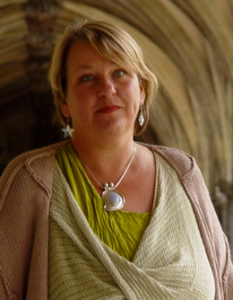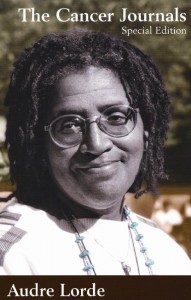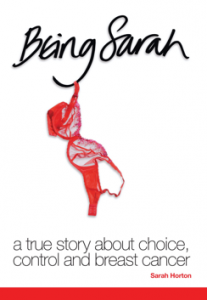 In October 2010 Sarah Horton, author of Being Sarah, appeared on Radio 4‘s Woman’s Hour with Jennie Murray and live radio interviews on Radio Five Live, BBC Radio Merseyside and BBC Radio Hereford and Worcester. Sarah discussed rising incidence rates, breast cancer recurrence, representations of breast cancer in mass media and pink campaigns, social support, and the need for research into causes. Sarah stated that the realities of breast cancer are being “glossed over” and that the focus needs to shift.
In October 2010 Sarah Horton, author of Being Sarah, appeared on Radio 4‘s Woman’s Hour with Jennie Murray and live radio interviews on Radio Five Live, BBC Radio Merseyside and BBC Radio Hereford and Worcester. Sarah discussed rising incidence rates, breast cancer recurrence, representations of breast cancer in mass media and pink campaigns, social support, and the need for research into causes. Sarah stated that the realities of breast cancer are being “glossed over” and that the focus needs to shift.
What was most fascinating to me was the question the interviewer posed to Sarah in the Radio Five Live interview. She asked:
“Is there a danger that your message, no matter how true it is… is so disheartening as to be unhelpful?”
I’m aghast. Yet, this pointed question is one that echoes throughout public discussion whenever anyone questions the status quo about breast cancer. Sarah Horton’s answer was a levelheaded and unequivocal no because Sarah believes in the power of truth telling. She stands in a long line of strong women who believe that their silence will not protect them.
Thirty years ago, Audre Lorde published excerpts from her cancer diary, The Cancer Journals (first published in 1980 and then republished in 1995 and 2006.) In it, Lorde urged cancer survivors to support one another, yes, but also to speak out about the general cultural push to render the devastating impacts of breast cancer invisible. Lorde wrote:
“I was going to die, if not sooner then later, whether or not I had ever spoken myself. My silences had not protected me. Your silence will not protect you…while we wait in silence for that final luxury of fearlessness, the weight of that silence will choke us.”
Thirty years aft er Audre Lorde first published her cancer journals, Sarah Horton published hers. Though they are unique in many ways, they also share the prophetic message that we must give voice to realities that will cause harm if left unattended.
er Audre Lorde first published her cancer journals, Sarah Horton published hers. Though they are unique in many ways, they also share the prophetic message that we must give voice to realities that will cause harm if left unattended.
Across the pages of Being Sarah, Sarah Horton writes:
“We are hiding from the truth…We’re still smiling, us women…We cover it up…We don’t challenge. We accept breast cancer and its treatments. We deal with it, and we deal with it well…Have we blinkered ourselves with pink-tinted glasses here? I am not prepared to join in this collusion of silence.”
What we can learn from these journals, written three decades apart, is that breast cancer has shifted from a stigmatized disease that left women in isolation to one that silences them in a sea of pink. Fewer women die from the disease now than they did during the dark past. Some treatments are more successful. But the culture is still afraid to speak the whole truth about breast cancer. As incidences rise among men and women, diagnostic technologies fall short, treatments fail, side effects linger, breast cancers recur, the number of deaths each year remain far too stable, and no prevention or cure exists for invasive disease, the image of breast cancer remains undeniably, optimistically joyful. At this point in our history, pink consumption and awareness activities have taken priority over truth telling.
What do we stand to lose if our message, no matter how true it is… is so disheartening? Perhaps we should ask, what do we stand to gain?
Click here to listen to Sarah Horton’s interviews.










Well said, Gayle. As an ovarian cancer patient, I hate to point the finger at the pink movement, but at least you’re getting some airtime, whether it’s productive or not. We’re well below the radar screen, despite the relaxing of social mores that kept us from uttering words like “breast” and “ovary” in public. But is bad press really better than no press at all? I wish a big name (SGK, you know who you are) would use some of their clout to question current realities and policies instead of touting this useless “awareness” ad infinitum.
Such a good question. Is it better to be oversaturated or ignored? I hope that questioning the pink status quo will open our eyes to the broader cancer burden, the industry, and the inequalities in public health. I’ve added your blog to my list, and I appreciate that you are part of the discussion. The radar screen has to get wider and deeper. The pink ribbon does not speak for everyone.
That really is such an important question. I think that all the pink ribbons have made a difference in quality of life for BC patients, while other cancers go largely ignored. The danger is, in my opinion, that all these ribbons convince the wider public that everything is just fine and that everyone with cancer gets better. That leads to complacency, our worst enemy.